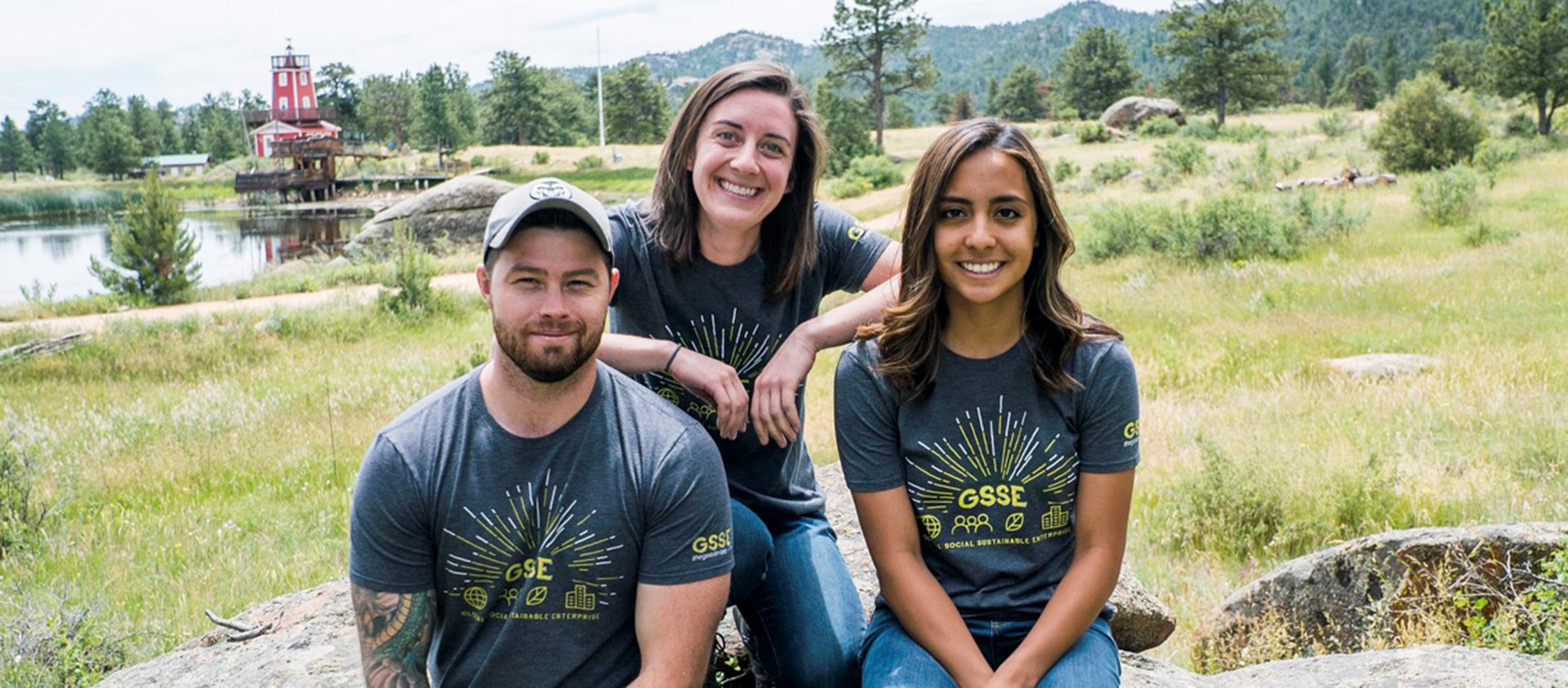
Some photos in this story were taken last summer.
Impact MBA Practicums Harness Big Ideas for Social Change
Yak-fiber winter wear. Islamic financing to support immigrants and refugees’ businesses. Seaweed feed additives that help cows combat global warming.
They’re all in a day’s work for College of Business Impact MBA students as they develop business ventures as part of their summer practicum. The experiential learning portion of the program gives teams of students the opportunity to develop a venture designed to promote positive change in environmental and social problems.
By implementing triple bottom line business plans that strive to deliver sustainability in every aspect of their ventures, students have the opportunity to develop business models with tangible, real-world results.
“The practicum is a very unique part of our program,” Kat Ernst, Impact MBA program director said. “It’s a primary reason many of our students choose to participate in the Impact MBA. Rather than a planned international trip like many other MBA programs offer, Impact students put their classroom learning into practice by planning and organizing their own 40- to 60-day market research experience.”
At the end of the program’s final semester, students’ venture projects culminate in a pair of competitions. Each team formally presents its business plan to a panel of professionals as a part of classwork, and also showcases its elevator pitch to the public. Winners of both receive cash prizes that can be used as seed money to launch the ventures.
This year’s cohort addresses a wide range of issues.
Well Nav
The Big Idea: The pursuit of a life well lived should be available to everyone, regardless of their behavioral, cognitive, physical or behavioral challenges. The team’s business plan earned them first place in the program’s annual pitch competition.
How Well Nav is doing it: Starting by building partnerships with individuals and professionals to identify the largest gaps in the disability support network, Well Nav is developing strategies to centralize support resources. Focusing on developing an infrastructure that leverages existing support systems while reducing barriers, Well Nav provides system-level guidance for people with disabilities. The venture has also built and app that connects users with the existing support systems available in their areas.
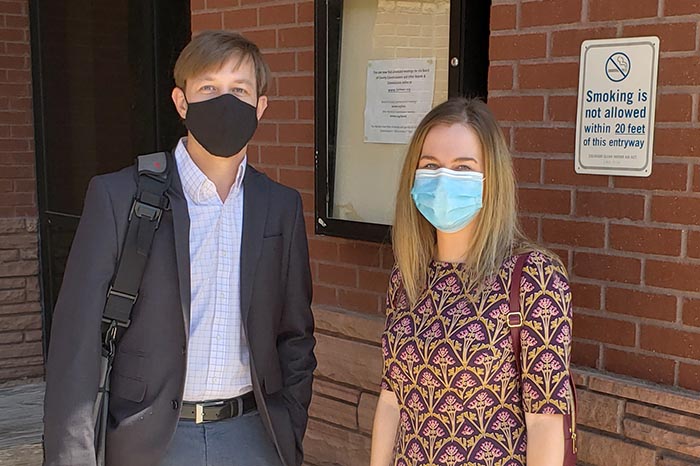
Business Pitch
“It is exciting to think that something I am working on could help make people’s lives better.”
– Annalee Hummer
WellNav chief executive officer/GSSE student
ImmPower
Big Idea: Enable immigrants and refugees to achieve the American dream by providing them alternative financing when they lack access to the capital necessary to kickstart their entrepreneurial vision in their new home.
How ImmPower is doing it: Building on concepts of Islamic financing, ImmPower is developing no-interest financial instruments for use by marginalized populations. Building on Manezha Sukhanyar’s prior experience as chief of Islamic banking and vice-chair of the Afghanistan Banking Association, ImmPower has partnered with CEDS Finance to develop products based around Islamic lending principles that eschew traditional roles such as lender and borrower in preference of models such a profit-and-loss sharing contracts, lease-to-own agreements and installment sales. Ultimately, the venture will work with many partners to provide alternative financing to immigrant and refugee committees.
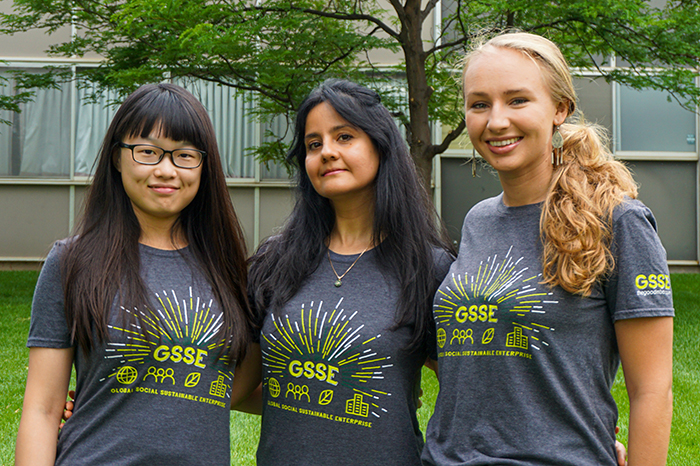
“I really wanted to learn the technical skills that you learn in a MBA program, but I wanted to do something that focused on how business could be used to help address the world’s problems.”
– Marya Skotte
ImmPower co-founder/GSSE student
Yak the Blue
Big Idea: Contribute to regeneration of Mongolia’s severely depleted ecosystems and the economic stability of herders by developing products sourced from yak fiber.
How Yak the Blue is doing it: The venture partners with Mongolian herdsmen to source material for scarves, sweaters and winter hats manufactured from responsibly sourced yak fiber. Yak fiber is up to 40 percent warmer than Merino wool and offers similar antimicrobial properties while also boasting softness comparable to cashmere. Yak have a regenerative impact on Mongolian grasslands due to the way they disperse seeds and replenish topsoil as they roam long distances. Yak the Blue encourages herders to shift away from current unsustainable herding practices by involving them in a profit-sharing structure, allowing them to depend more upon sustainable yak herds.
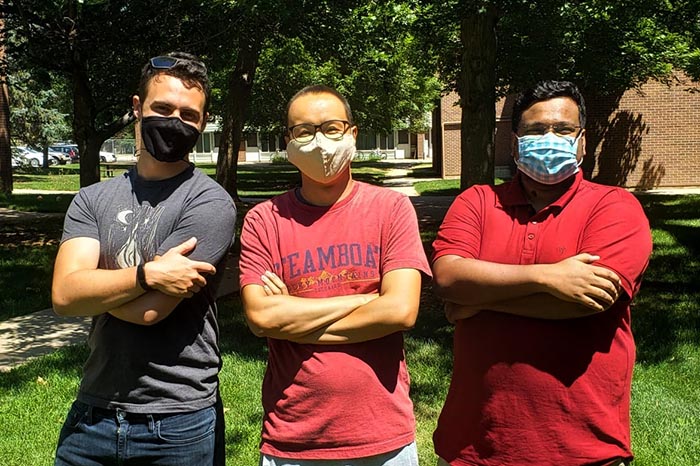
“Its strong culture towards finding innovative solutions to the most pressing issues differentiates the GSSE program from other MBA programs.”
– Amaraa Otgonbayar
Yak the Blue supply chain development and product development/GSSE student
ReKaivery
Big Idea: Divert edible food from the landfill when supply chain or sales systems fall through for agricultural suppliers and grocery distributors by creating a fallback market for unsold goods.
How ReKaivery is doing it: When access to markets is limited or planned sales of food fall through for various reasons – changes in the retail and hospitality environment or unexpected changes in demand, for example – farmers and distributors are often left with unsold food that ultimately ends up in landfills. ReKaivery is developing a networking tool that connects farmers and distributors with registered local retail users such as restaurants to facilitate secondary sales when suppliers’ original plans fail to materialize. Sellers mitigate losses on their sales, while buyers leverage contingency pricing for improved profits or competitive pricing.
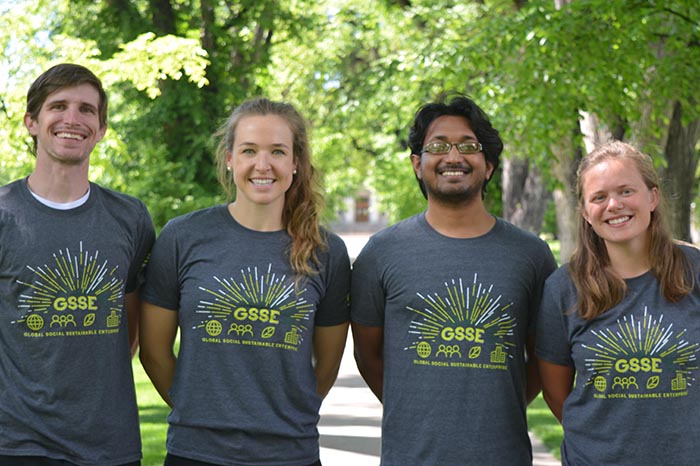
“Growing up in New Zealand, the environment was central to my life. When I found an MBA which also held the environment at its core, it was the logical decision.”
– Natasha Lloyd
ReKaivery communications and marketing/GSSE student
Seagraze
Big Idea: Reduce the amount of greenhouse gasses emitted by livestock by switching to feed that contains cultivated seaweed proven to cut methane emissions in cows.
How Seagraze is doing it: A species of seaweed has been shown to reduce cows’ methane emissions by up to 90 percent, and Seagraze is developing a livestock feed additive to harness its digestive benefits. By introducing the additive to cows’ feed, Seagraze hopes to eliminate up to 450 liters of methane per day per cow while also promoting better digestive health and improving cattle’s immune response. As the venture develops its additive, it’s also surveying the market for methane-reduced meat and dairy products to create a premium market for ranchers who use the additive.
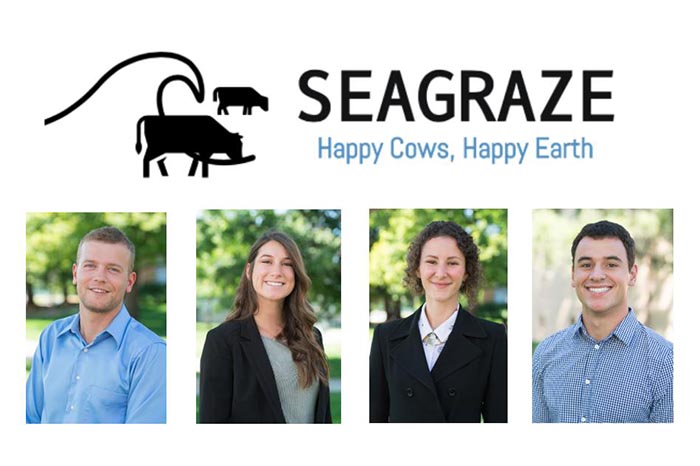
“It feels incredible to be so invested in tangible issues and to have the full backing and support of the Impact MBA faculty and staff.”
– Ethan Hahn
Seagraze project managment/GSSE student
Ubiquitous
Big Idea: Provide young people with access to period products, condoms and materials about life skills and mental health regardless of their social or economic standing.
How Ubiquitous is doing it: Reaching youth with an online educational platform and a mobile health unit, Ubiquitous is a social venture that supplements educational programs. The online platform provides students with access to information on basic life skills such as financial literacy, laundry skills and resume writing as well as materials on sexual, mental and physical health. A mobile unit connects licensed professionals and youth, while providing access to period products and condoms while traveling between neighborhoods or other hotspots frequented by tweens and teens.
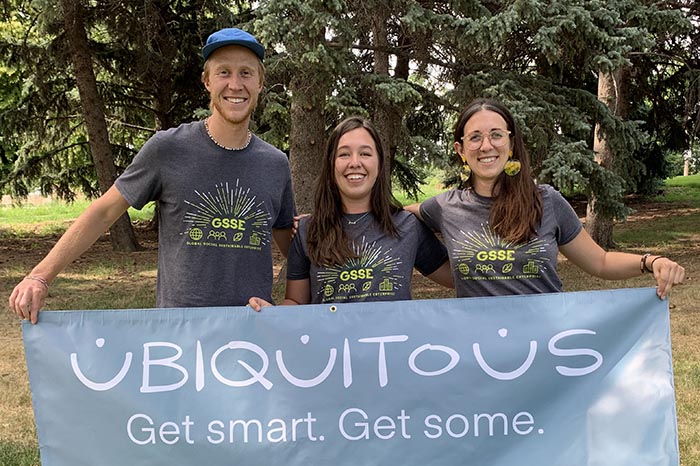
Business Pitch
“Business is more than profits and can also be a form of activism and influence societal progress and change.”
– Francie Saunders
Ubiquitous creative lead/GSSE student
Local Trove
Big Idea: Reduce packaging waste and carbon emissions by connecting local producers to their communities with a mobile bulk market.
How Local Trove is doing it: By partnering with local producers, Local Trove serves as an extension of community storefronts to bring bulk purchasing to a mobile shopping experience. Consumers enjoy the convenience of hyper-local point of sales as the mobile market’s circuit brings it within easy reach of their doorsteps. Local Trove aims to team with local companies to provide bulk foods such as rice, beans and spices as well as personal-care products like liquid soap and lotions to shoppers who bring their own reusable containers to reduce single-use plastics and nonrecyclable packaging.
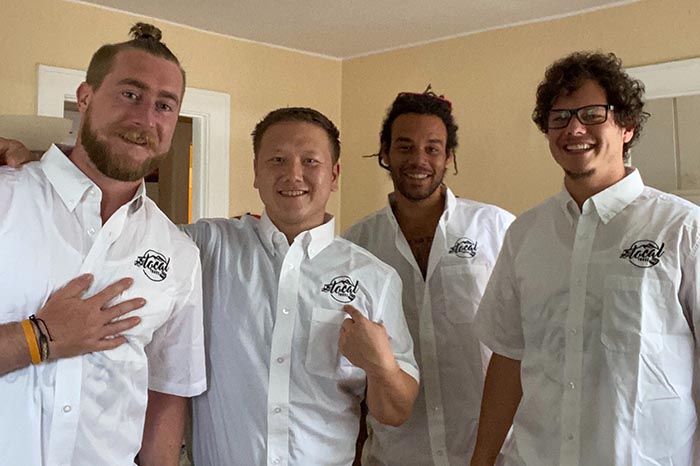
Sweet ReTreat
A cooperative of locally-owned, for profit, dairy-free ice cream parlors.
Attica Voting
A secure online voting platform based on distributed ledger technology.
Heirloomers
An e-commerce platform consolidating the sale of heirloom produce.